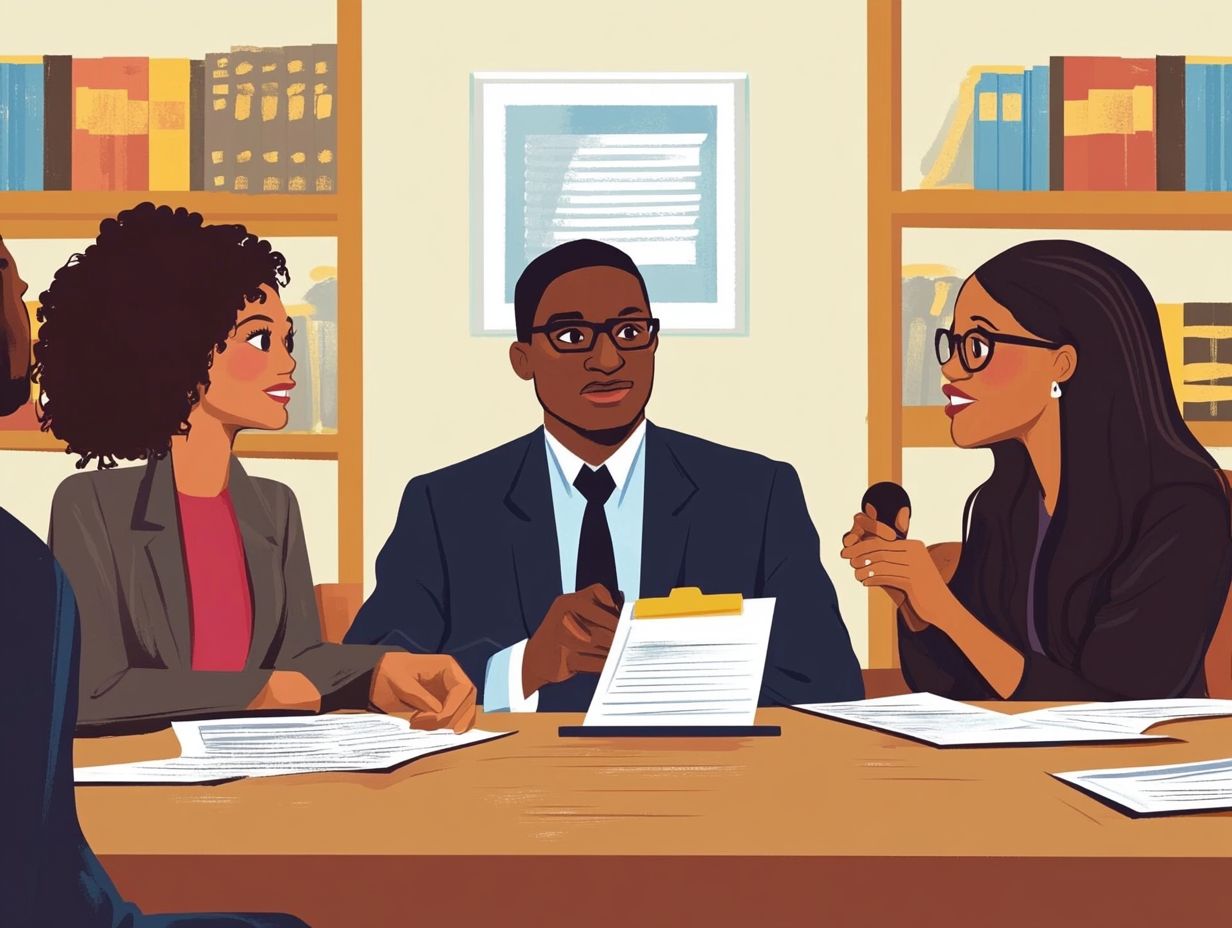How Legal Aid Works in Criminal Defense?
Understanding the challenges of the criminal justice system can be overwhelming, especially for individuals facing charges without adequate resources.
Legal aid means help with legal problems for people who can’t afford a lawyer, serving a vital function in ensuring everyone, regardless of their financial situation, has access to fair representation.
This article explores legal aid in criminal defense, examining its definition, eligibility criteria, types of services available, and the process for securing assistance.
Discover how legal aid fosters justice and contributes to improved outcomes for defendants.
Contents
Key Takeaways:

Legal aid provides crucial support to individuals who cannot afford legal representation in criminal defense cases. Eligibility is determined by various factors, including income, assets, and the severity of the case. By offering legal representation and advice, legal aid organizations help ensure fair outcomes and increased access to justice for defendants in criminal cases.
Overview of Legal Aid in Criminal Defense
Legal aid in criminal defense is essential for ensuring that individuals, especially those from marginalized communities, receive the legal representation necessary to navigate the complexities of the criminal justice system.
In New York City, organizations such as the Legal Aid Society and public defenders work diligently to bridge the justice gap by offering vital services and advocating for systemic reform.
This overview reveals why legal aid is crucial for everyone s right to justice and highlights the significance of legal aid in protecting rights, enhancing access, and supporting advocacy groups committed to empowering those entangled in the criminal justice system.
What is Legal Aid?
Legal aid is about providing the crucial legal assistance you need when you can t afford representation, especially for issues related to the criminal justice system and civil matters.
This vital service ensures that everyone has a pathway to justice. Legal aid comes in various forms, including civil legal aid, which helps with housing disputes, family law issues, and immigration challenges, as well as criminal defense, safeguarding your rights if you face charges.
For many, having qualified attorney representation isn t just a luxury; it s a necessity that can significantly influence case outcomes.
By promoting financial justice, legal aid works to close the gap between those who can pay for legal services and those who cannot, fostering a more equitable legal system.
Importance of Legal Aid in Criminal Defense
The importance of legal aid in criminal defense is immense, as it protects your rights and shields you from wrongful convictions while ensuring you have competent representation in court.
Access to quality legal services means that every defendant, regardless of financial circumstances, can expect a fair trial.
Public defenders, often handling overwhelming caseloads, play a crucial role in this arena, fiercely advocating for those unable to afford private representation. Their efforts, supported by numerous advocacy groups, strive for just outcomes for their clients and highlight systemic issues within the criminal justice system.
Through diligent courtroom advocacy, these defenders bring attention to the disparities faced by marginalized populations, paving the way for vital reforms that foster a more equitable legal landscape.
Eligibility for Legal Aid
Eligibility for legal aid depends on specific criteria that assess your financial situation, including income and asset requirements, which are vital for accessing essential legal services.
Understanding these factors is crucial for navigating the legal landscape effectively.
If you need help, don’t hesitate to seek legal aid. It’s your right to receive the assistance you deserve!
Income and Asset Requirements

Income and asset requirements are essential components of the eligibility process for legal aid. They determine whether you qualify for free or low-cost legal services.
These thresholds are carefully set, taking into account various factors such as the regional cost of living and current economic conditions. This is vital for accurately assessing your financial situation.
By establishing these specific limits, the legal system seeks to ensure equitable access to necessary legal representation for individuals who might otherwise find themselves dealing with legal issues alone.
The importance of these criteria in promoting financial justice cannot be overstated. They serve as a safeguard, directing support to those who are most in need.
Ultimately, this contributes to poverty alleviation and enhances the rights of vulnerable populations.
Other Factors that Determine Eligibility
Along with income and asset requirements, other factors are crucial in determining your eligibility for legal aid. These include the nature of your legal issue and your involvement within the system.
For example, if you’re facing criminal charges, the eligibility criteria may differ significantly from those dealing with civil matters like housing disputes or discrimination issues. Your geographical location also plays a role; some communities boast well-established support networks, while others may lack access to essential legal resources entirely.
Your previous legal representation may affect your eligibility, especially if you ve been dissatisfied with past counsel. Community clinics become invaluable allies in this landscape, guiding you through the eligibility process, offering advice on potential hurdles, and advocating for individuals facing discrimination or unequal treatment.
Don t navigate your legal challenges alone; help is readily available! They empower you to navigate your legal challenges more effectively, ensuring you re not alone in this journey.
Types of Legal Aid Services
You ll find a diverse range of legal aid services at your disposal, meticulously crafted to tackle a broad spectrum of legal challenges.
Whether you require assistance with criminal defense, civil legal matters, or pro bono services tailored for those in need, there s a solution available to support you.
Representation by a Lawyer
Representation by a lawyer is an essential element of legal aid, ensuring that you have access to qualified legal counsel when facing criminal charges. This advocacy can significantly influence the outcomes of your case, providing you with the expertise necessary to navigate the intricacies of the judicial system.
While public defenders strive to deliver crucial defense for those unable to afford legal counsel, private attorneys typically offer more personalized services to clients who can pay. Both roles are critical; public defenders juggle heavy caseloads and limited budgets, yet they play a vital part in safeguarding the rights of the accused.
Public interest law also plays a critical role in advocating for societal issues, ensuring that marginalized voices are amplified in legal disputes. These attorneys work together to address many legal issues, promoting justice and equality within the courtroom.
Legal Advice and Guidance
Legal advice and guidance are critical services provided by legal aid, enabling you to effectively navigate your legal challenges and fully understand your rights within the legal system.
By securing informed counsel, you empower yourself to assert your rights, confront injustices, and make educated decisions regarding your legal matters. This empowerment is especially crucial in communities where various forms of discrimination may arise, as proper legal support can tackle these issues head-on.
Community engagement plays a vital role in these services, cultivating a network that provides resources and education to those who need it most. This collective effort not only safeguards individual rights but also heightens awareness of systemic injustices, fostering a more equitable environment for everyone involved.
Process of Obtaining Legal Aid

The journey to securing legal aid usually encompasses a series of steps, including an application and approval process.
This meticulous approach ensures that eligible individuals receive the essential legal services they require in an efficient manner.
Application and Approval Process
The application and approval process for legal aid is designed to streamline intake. This makes it easier for you to secure legal assistance.
Legal aid refers to free or low-cost legal services for those who cannot afford them. This comprehensive approach is geared toward quickly and efficiently connecting you with the resources you need. To get started, you should locate a community clinic nearby that specializes in legal aid services.
Your first step in the application will involve filling out a detailed form, requiring information about your personal circumstances, income levels, and the specific legal issues you’re facing.
Once you submit the form, you can typically expect a response within a few weeks. The review process is thorough and quick, ensuring that eligible cases like yours receive the prompt attention they deserve.
Role of Legal Aid Organizations
Legal aid organizations are essential in delivering legal services and advocacy. They work hard to ensure everyone has access to justice. These organizations are committed to ensuring equitable access to justice for everyone, especially for those in underserved communities who might not be able to afford legal representation otherwise.
By providing a wide array of services including legal consultations, court representation, and education on rights you ll find that their contributions are vital in dismantling systemic barriers that hinder access to necessary support.
Their partnerships with advocacy groups and community clinics amplify their effectiveness, allowing for a more holistic approach to both legal and social issues. Such partnerships not only bolster community resources but also drive systemic change, paving the way for a fairer society.
Benefits of Legal Aid in Criminal Defense
Access to justice is urgent and essential, especially for marginalized communities. The advantages of legal aid in criminal defense are numerous, primarily emphasizing enhanced access to justice and better outcomes for defendants grappling with significant legal challenges in the courtroom.
Increased Access to Justice
Increased access to justice stands out as one of the primary benefits of legal aid, granting marginalized communities the legal representation and support they desperately need.
By providing essential resources, advocacy groups play a vital role in empowering individuals like you, ensuring that you can effectively navigate the complexities of the legal system.
This support is especially crucial when tackling issues related to poverty, where financial constraints often result in unequal treatment in legal matters.
Legal aid programs not only offer representation but also educate communities about their rights, equipping you to advocate for yourself.
As you gain better access to legal resources, you’ll find yourself more capable of challenging injustices and attaining fair outcomes. This empowerment allows you to fight for fair outcomes, ultimately working towards a society where everyone is treated equitably.
Improved Outcomes for Defendants

Legal aid is vital in enhancing outcomes for defendants, significantly lowering the risk of wrongful convictions and ensuring that you receive fair representation in criminal proceedings.
Research shows that you are 30% less likely to be convicted if you are represented by a legal aid attorney compared to going it alone without legal support.
A notable case study in New York highlighted that access to legal aid resulted in a remarkable 25% reduction in pre-trial incarceration rates. This underscores the importance of courtroom advocacy and rights protection in defending the interests of the accused.
With expert legal support, you can fight against biases and ensure your right to a fair trial.
Frequently Asked Questions
What is legal aid in criminal defense?
Legal aid in criminal defense refers to the provision of legal services to individuals who cannot afford to hire a private attorney for their defense in a criminal case. This may include legal advice, representation in court, and other legal assistance.
Who is eligible for legal aid in criminal defense?
Eligibility for legal aid in criminal defense varies by jurisdiction but is typically based on income level and/or the seriousness of the criminal charges. Some legal aid organizations may also consider other factors such as assets and family size.
How does legal aid work in criminal defense cases?
Legal aid organizations provide free legal help to those who qualify. This includes having a lawyer represent you in court and helping with paperwork.
What types of criminal cases are covered by legal aid?
Legal aid can assist with many cases, like misdemeanors, felonies, and juvenile matters. Be aware that some organizations may have limits on what they can take due to resources.
Do I have to pay for legal aid in criminal defense?
Most legal aid services are free for eligible individuals. Some might ask for a small fee based on your income.
How can I find legal aid for my criminal defense case?
Look for local legal aid organizations online or reach out to your local bar association. You can also ask your court or public defender for referrals!






